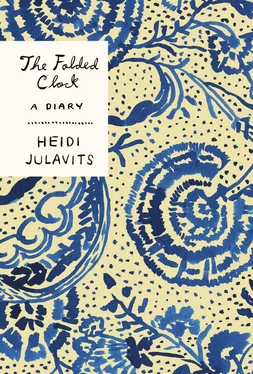I trailed my husband. I continued our heated dispute to which only I was party. In my head I said to him: Does having two one-quarter Jewish children give me rights to a Jewish connection? Did the failure in the 1970s of Portland, Maine’s WASPiest law firm to hire my father, maybe because he was presumed to be Jewish (“How was your holiday ?”) give me rights to that connection? What about the fact that my best friend in graduate school so believed I was Jewish that she mocked me for being a Jewish denier, and would pick up from my desk the old daguerreotypes of my just-off-the-boat-in-nineteen-oh-whatever relatives on my mother’s side, the schnozzy Dabelsteins, and point at them and say, grinningly, and with fake credulity, Not Jewish! , and then point to photos of my dark-haired father and dark-haired brother and exclaim with the same expression and intonation, Not Jewish! The name “Julavits,” as she likes to point out, is doubly Jewish. My name, she says, is basically Jewjew .
I followed my husband into the dining room. Aptly, the question of defining Jewishness was a primary preoccupation of the Wannsee Conference. The conference minutes are basically dedicated to solving the problem of who counts as Jewish, who only partially counts as Jewish, and who does not count as Jewish at all. Proposals for determining the sub-, and sub-sub-, and sub-sub-sub-“degrees” stretched, under glass, on side-by-side typed sheets of paper, the circumference of the large room. For example:
(2) TREATMENT OF PERSONS OF MIXED BLOOD OF THE SECOND DEGREE
Persons of mixed blood of the second degree will be treated fundamentally as persons of German blood, with the exception of the following cases, in which the persons of mixed blood of the second degree will be considered as Jews:
(a) The person of mixed blood of the second degree was born of a marriage in which both parents are persons of mixed blood.
(b) The person of mixed blood of the second degree has a racially especially undesirable appearance that marks him outwardly as a Jew.
(c) The person of mixed blood of the second degree has a particularly bad police and political record that shows that he feels and behaves like a Jew.
In my head I argued my case to my husband: all of my fully Jewish friends think I’m Jewish! (2c, “behaves like a Jew”). Some of my nearest relatives appear to be Jewish! (2b, “racially especially undesirable appearance that marks him outwardly as a Jew”). The first guy who ever went down on me was Jewish! (Certainly this “deportation”-worthy transgression was covered somewhere in the minutes.)
Afterward, my husband and I biked to the grocery store. I was feeling excluded, still, and wanted to address that feeling of exclusion by highlighting how totally not Jewish I supposedly was (wasn’t?), and how far apart from one another my husband and I were on this date. I tested; I poked. I remarked on the malevolent stylishness of Hitler, and that I understood how people were (to tragic ends) seduced by his aesthetic bombast and precision. My husband said that Hitler’s aesthetic didn’t appeal to him at all. By this he was saying (I thought) that he was better than those people who found it seductive. That he was better than me , because I claimed to understand how a person, back in the day, might, at their peril, be seduced.
I cited the many scholarly books written on Nazi style by people who were smart and knowledgeable; on the basically irrefutable intellectual proof that the Nazis were aesthetically intoxicating, to which he said, quite innocently and also correctly, “I just don’t think that anyone would join the Nazis because of the way the party looked.” At which point (we were now in the berry aisle at Kaiser’s, our local supermarket chain) I blew. I said, Of course I wasn’t saying that people joined the party just because they liked the uniforms and the fucking interior decor. I accused him of reducing everything I said to the claims of a simpleton; that he refused to have a conversation with me, or a discussion with me, that he was only interested in staking out his belief territory, and in so doing relegating me to a belief territory that was boneheaded and morally weak (I might have been seduced!). I was trying to talk to him and to emotionally engage with him (by attacking him, but whatever); he, meanwhile, just wanted to tell me who he was, or who he’d have been, in the face of Hitler. He was defining himself apart from everyone, but especially apart from me.
My husband was totally surprised, as he often is when I explode like this. I tend to give no hint of disturbance until I am massively and performatively disturbed. He was also mortified that this fight should be happening in Kaiser’s, and within earshot of many English-speaking Germans. He said in a low voice, “Please, let’s not fight about Hitler.” (The other day he said to me, “Please, let’s not fight about military time.”)
I countered that this “fight” had nothing to do with Hitler; that he’d started behaving like an intellectual separatist while we were talking about movies in the Conference house gardens. I told him I had been really insulted when he’d told me what the movie we’d watched many times together was “about.”
“I know what that movie’s fucking about,” I said.
As he must do in these situations — What else is there to do save divorce me? I really did pick a fight with him the other day about military time — he approached me calmly. He tried to offer an honest, outsider perspective. He promised that he hadn’t committed any of the crimes I’d pinned on him. He said, quite objectively, “I think you’re just looking for reasons to be offended.”
He really did not offer this observation accusatorially. He offered it kindly, as an explanatory diagnosis that might provide me some relief. It didn’t give me relief, but it did give me pause. Was I looking to be offended? I knew I was in a terrible mood. A terrible yet officially documented spousal mood. At the admissions desk at the Wannsee Conference house, my husband whispered that he’d been invited to speak at the Wannsee Conference, and I’d missed the joke entirely. My response was: Really? He’d been invited to speak there, too? And I hadn’t been? I wanted to say to him: I’m not looking to be offended. I’m really not looking. It’s just that when I opened my eyes today, offense was all that I could see.
Today I tried out a new space in the library because my old space, the one with the catwalk, is going to be ruined. Not according to the loud librarians who, in an officious pack, roamed the room and pointed out its flaws. To them, this room will not be ruined; it will be improved. The librarians have tacked a sign to the bulletin board explaining their intentions. “The catalog has not been updated since 1985,” says this sign, “and information in the catalog becomes increasingly inaccurate and obsolete every day.” The card catalog is a threat to truth and relevance! It is a constantly intensifying, present-tense menace! It becomes . It does this every day .
Now I am in a different catwalk, one threatened only by obsolete books. I have read many of these books; I seem to have landed in the women’s studies nook of the Dewey decimal system. HQ 1236.5–HQ 1665.15 are my coordinates. I was a women’s studies minor in college. I can’t recapture what made me want to study women, but I remember wanting to do so from my very first semester. I tried to convince a friend from my dorm to take a class with me. I was scared to do it alone. “Fuck no,” she said. “I hear women touch each other in those classes.” She was hyperbolic, this friend, tall and mouthy. She’d go on to play rugby, and do heroin, and marry a scruffy mountain genius, and raise chickens in the city.
Читать дальше












